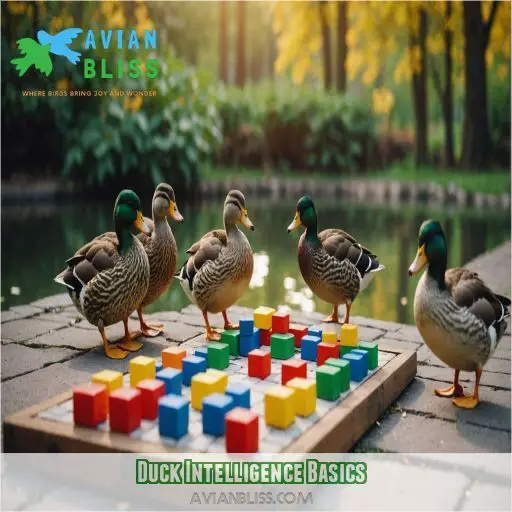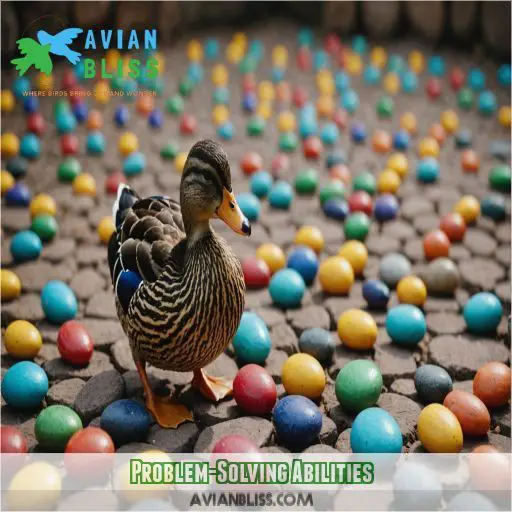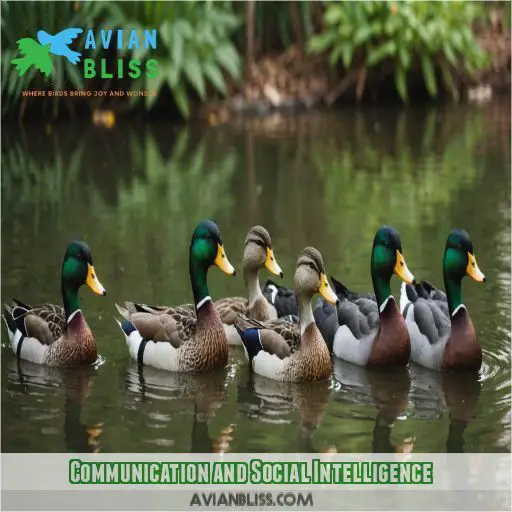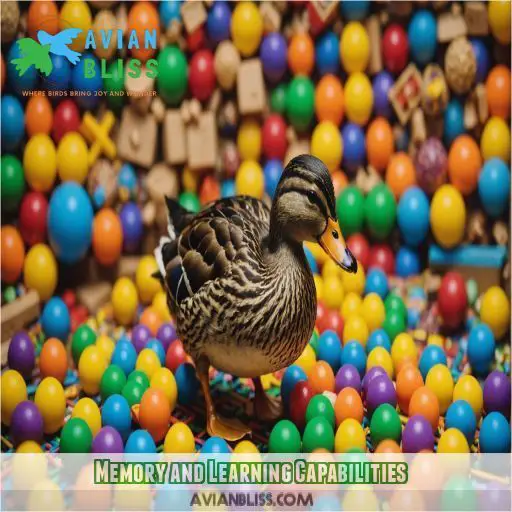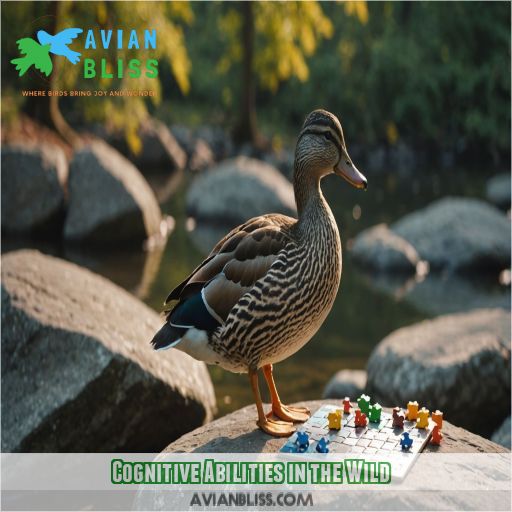This site is supported by our readers. We may earn a commission, at no cost to you, if you purchase through links.
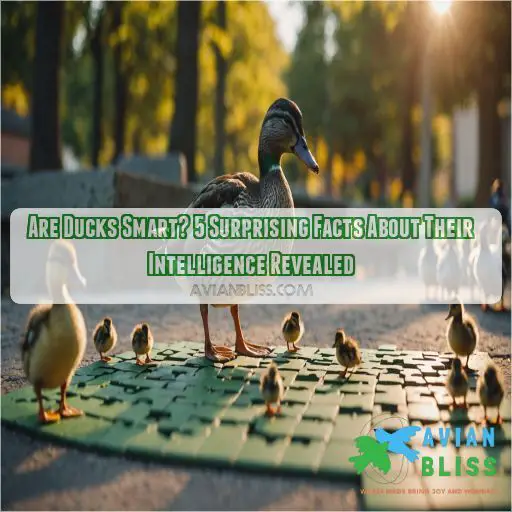
Ducks are capable of complex behaviors like problem-solving, social interactions, and adaptability, making them more intelligent than you might think.
They use tools to forage and nest, adapt to changing environments, and even have a sophisticated language system with distinct dialects and social calls.
But that’s not all – ducks also have impressive memory and learning capabilities, recognizing individual humans and other ducks, and recalling landmarks to find food and shelter.
And that’s just the tip of the iceberg – there’s more to discover about these clever birds!
Table Of Contents
Key Takeaways
- Ducks are ridiculously resourceful – they use tools to dig up food, line their nests, and even weigh down plants to make them easier to eat. Who knew they were the MacGyvers of the bird world?
- These clever birds have a sophisticated language system, complete with distinct dialects and social calls. They can warn each other of predators, signal the location of food, and even gossip with each other – talk about quacking good communication skills!
- Ducks are surprisingly adaptable, coping with climate change, habitat loss, and pollution by adjusting their foraging strategies and migrating to new areas. They’re like the ultimate survivors, making the most of a bad situation!
- They’ve also got impressive memory and learning capabilities, recognizing individual humans and other ducks, and recalling landmarks to find food and shelter. It’s like they’ve got their own built-in GPS system – no wonder they always seem to find their way back home!
Duck Intelligence Basics
You’re probably wondering if ducks are more than just cute, quacking birds – and the answer lies in understanding their intelligence. Let’s start with the basics: what does it mean for an animal to be intelligent, and how do ducks fit into the picture?
Definition of Intelligence in Animals
What does it mean for an animal to be intelligent?
It’s about more than just book smarts or puzzle-solving.
Animal Intelligence includes problem-solving, social interactions, and adaptability.
Ducks check these boxes.
They’re good at finding food, getting around, and communicating with quacks and body language.
They’re also caring, forming meaningful relationships with other ducks and even different species.
Common Misconceptions About Duck Intelligence
You might assume ducks aren’t the brightest bulbs in the barnyard, but don’t be fooled—they’ve got more going on upstairs than meets the eye. Here are some common misconceptions about duck intelligence, quacked and decoded:
- Brain Size Matters: Ducks’ small brains don’t equate to simplicity. Duck brain size is similar to other birds, and they can perform complex tasks.
- Geese Get the Glory: Ducks vs. geese intelligence is a common comparison, but ducks are just as capable. Both can be trained, and wild ducks have impressive navigation skills.
- Emotional Birds: Ducks experience emotions like joy, fear, and frustration. They form strong bonds and show empathy, busting the myth that they’re robotic responders.
- Quacks Get Complicated: Duck language is nuanced, with various quacks, whistles, and body signals conveying danger, food, and social messages.
Evolutionary Pressures Shaping Duck Cognition
Let’s take a closer look at what’s shaped duck intelligence over time. After all, understanding why they’re so smart can give us a whole new appreciation for these feathered friends.
| Evolutionary Pressure | Influence on Duck Cognition | Example Behaviors |
|---|---|---|
| Brain Size | Ducks’ brain size may reflect adaptations for specific survival needs, like efficient navigation and predator avoidance. | Migrating in V-formation, using stars for navigation. |
| Survival Strategies | Natural selection favors ducks with problem-solving skills, ensuring they can secure food and shelter. | Using decoy ducks to attract prey, nesting in safe, hidden spots. |
| Predator Avoidance | Ducks that can outsmart predators pass on their genes. | Feigning injury to distract predators from their nest, recognizing and avoiding dangerous areas. |
| Climate Change | Ducks adapt to changing environments, nesting earlier in warmer springs. | Adjusting migration routes and timing due to shifting weather patterns. |
Problem-Solving Abilities
Ducks display impressive problem-solving skills, especially when it comes to finding food and building nests. They’re clever at figuring out how to use tools and adapt to new environments, proving they’re more than just quacks with feathers.
Tool Use in Foraging and Nesting
You’re about to discover the MacGyvers of the bird world – ducks! They’re using tools to get the job done, from foraging to nesting. Here are some surprising examples:
- Sticks for digging: Ducks use sticks to dig up tasty roots and tubers.
- Leaves for lining: They line their nests with soft leaves to keep eggs cozy.
- Pebbles for weighing: Some ducks use pebbles to weigh down aquatic plants, making them easier to eat.
- Mud for building: Ducks collect mud to build sturdy nests that withstand harsh weather.
Adaptability in Changing Environments
You’re probably wondering how ducks cope with climate change impacts, habitat loss, and pollution effects.
Well, they’re surprisingly adaptable!
When faced with resource scarcity, ducks adjust their foraging strategies and migrate to new areas.
In urban environments, they’ve even been known to exploit new food sources, like park ponds and garbage cans.
Talk about making the most of a bad situation!
Communication and Social Intelligence
You might be surprised to learn that ducks have a sophisticated communication system that goes beyond just quacking – they use a range of vocalizations and visual cues to convey information and coordinate behavior. As we explore the social side of duck intelligence, you’ll discover how these birds form complex hierarchies, navigate romantic relationships, and even gossip with each other.
Quacking and Other Forms of Duck Communication
You’ve seen ducks quacking away, but have you ever wondered what they’re actually saying? It turns out, ducks have a sophisticated language system, complete with distinct dialects and social calls. They even have specific warnings for predators, like a "hawk alarm" to alert fellow ducks of danger. This complex communication evolution showcases their impressive cognitive abilities.
Social Hierarchy and Flock Dynamics
You’re about to enter the fascinating world of duck social hierarchy. Here’s what you need to know:
- Dominance displays: Ducks establish pecking order through aggressive behaviors like quacking, feather fluffing, and biting.
- Conflict resolution: They resolve disputes through submissive behaviors like crouching or retreating.
- Flock leadership: Dominant ducks lead the flock to food and safety.
- Social grooming: They strengthen bonds by preening and cleaning each other’s feathers.
Mate Selection and Pair Bonding
You’re probably wondering how ducks pick their perfect match.
It turns out, they’re quite choosy!
Duck courtship rituals involve elaborate displays of quacking, preening, and feather-fluffing.
Pair bonds can last from a breeding season to several years, with some species being monogamous while others are polygamous.
Mate selection cues include visual and auditory displays, and surprisingly, duck "divorce rates" are relatively low.
Memory and Learning Capabilities
You might be surprised to learn that ducks have impressive memory and learning capabilities that help them navigate their environment and interact with others. From recognizing individual humans and ducks to learning from experience and imitation, let’s explore the fascinating ways ducks use their brains to adapt and thrive.
Spatial Memory and Navigation
You’re probably wondering how ducks navigate their surroundings. It turns out, they use spatial memory to recall landmarks like ponds, trees, and buildings. Their memory accuracy is impressive, helping them overcome navigation challenges. Through spatial learning, ducks create mental maps to find food, shelter, and mates. It’s like they’ve their own built-in GPS system!
Learning From Experience and Imitation
You’ve seen how ducks navigate their surroundings, but did you know they’re also masters of learning from experience? Through social learning and imitative foraging, ducklings develop essential skills by mirroring their mothers’ actions. This cultural transmission is made possible by mirror neurons, which help them mimic behaviors. It’s a key aspect of their remarkable memory and learning capabilities.
Recognition of Individual Humans and Other Ducks
You’re probably wondering if ducks can recognize you or their fellow quackers. The answer is yes! Ducks have impressive memory and learning capabilities, which help them recognize individual humans and other ducks. This ability is really important for their social interactions and bonding. Here are some fascinating facts about duck recognition:
- Familiar faces: Ducks can recognize their owners and even respond to their names.
- Duck social memory: They can recall the faces and behavior of other ducks, helping them establish a social hierarchy.
- Species-specific recognition: Ducks can distinguish between different species, including humans, and adjust their behavior accordingly.
- Long-term memory: They can remember individual humans and other ducks for months, or even years, after initial encounters.
Cognitive Abilities in the Wild
In the wild, ducks show off some seriously smart skills that help them stay alive. From clever ways to avoid predators to finding food like pros and amazing migration journeys, you’ll uncover the secrets of how these waterfowl thrive in their natural habitats.
Predator Avoidance and Defense Strategies
You’re probably wondering how ducks avoid predators. Well, they’re masters of disguise, using camouflage to blend in with their surroundings. They also recognize predator calls, alerting their fellow ducks to danger. When threatened, they employ group defense strategies, protecting their ducklings and using clever flight patterns to evade predators. Pretty smart, right?
Foraging Strategies and Food Caching
You’re probably wondering how ducks adapt to changing food availability. It turns out, they’re experts at food hoarding and caching. They recall cache locations with impressive memory, taking into account seasonal changes and environmental factors. By doing so, they guarantee a steady food supply, showcasing their remarkable cognitive abilities in the wild.
Migration and Homing Behaviors
You’re about to witness some impressive navigation skills! Ducks migrate thousands of miles each year, following established migration routes and using celestial navigation mechanisms. Their homing instincts are triggered by environmental cues like seasonal changes, temperature, and daylight. It’s like they’ve a built-in GPS system, allowing them to find their way back home with remarkable accuracy.
Frequently Asked Questions (FAQs)
Can ducks recognize and respond to their owners voices?
You’re wondering if your ducks will remember you after a short time away. Research suggests ducks have good memories and can recognize human faces and voices, so it’s likely they’ll respond to your voice when you return.
Do ducks have a natural instinct to follow leaders?
You’re wondering if ducks have a natural instinct to follow leaders? Well, it turns out they do! In the wild, ducks often follow experienced birds to find food, avoid predators, and navigate migration routes.
Can ducks be trained to perform tricks like dogs?
You can train ducks to perform tricks, but it’s a bit tougher than with dogs. Ducks are naturally skittish, so start with simple tasks, use positive reinforcement, and be patient – it’s a quack-worthy challenge!
How do ducks adapt to living in urban environments?
Ducks adapt to urban life by seeking out human-made water sources like ponds and fountains. They also feed on insects and plants in parks and gardens, and nest in hidden spots.
Can ducks experience emotions like stress and happiness?
Do ducks feel emotions?" You bet! Ducks have rich emotional lives and feel joy, sadness, and fear. They express emotions through vocalizations and body language, and they show empathy for each other.
Conclusion
Ever wondered if ducks are just cute, quacking creatures or something more? Turns out, they’re pretty smart! We’ve uncovered five surprising facts that showcase their intelligence, from problem-solving skills to sophisticated communication. So, are ducks smart? Absolutely! These findings shatter misconceptions, revealing clever creatures with unique abilities that adapt, learn, and thrive in their environments.

